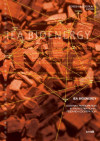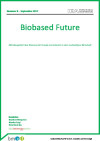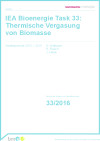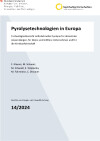Suchergebnisse
Energieforschungserhebung 2010

Energie - Forschung und Entwicklung: Ausgaben der öffentlichen Hand in Österreich 2010
Energieforschungserhebung 2005

Ausgaben der öffentlichen Hand in Österreich - Erhebung für die IEA
IEA Bioenergy

Austrian Participation in an international Research Cooperation
Forschungsforum
4/2000
Herausgeber: BMVIT
Englisch, 6 Seiten
Downloads zur Publikation
Energieforschungserhebung 2007

Ausgaben der öffentlichen Hand in Österreich Erhebung für die IEA
Technology and Innovation Roadmap "BioHeating and Cooling"

The Roadmap links with the energy research strategy of the Austrian Council for Research. It was developped together with national stakeholders from industry to deduct recommendations for policy makers. It includes clear suggestions for research topics until 2020 and provides an outlook on the contribution of biomass to the heating sector of a decarbonised energy system in 2050.
Wirtschaftlichkeits- und CO2-Bewertung ausgewählter biomassebasierter Energieträger für Österreich (BIOWERT)
Beitrag zur Dekarbonisierung 2040
Agriculture 2020
Agriculture will become an important supplier of sustainable energy services for society. However, this sector can only fulfil this role if it operates on the base of sustainable energy provision itself. The project will determine the necessary measures to achieve this state for a concrete regional setting (eastern Styria) by the year 2020.
Pyrolysis technologies in Europe
Technology overview of medium-fast pyrolysis for decentralised applications, for small and medium-sized enterprises and for the circular economy
Energieautarker Bezirk Güssing
Ausgehend vom Modell "Energieautarke Stadt Güssing" wird ein Konzept zur Selbstversorgung des Bezirks Güssing mit Strom, Wärme und Treibstoff mit ausschließlich im Bezirk nachwachsenden Rohstoffen erarbeitet, um einen nachhaltigen Impuls für die regionale Entwicklung zu erreichen.
Landwirtschaft 2020
Die Landwirtschaft stellt eine wesentliche Grundlage der nachhaltigen Energieversorgung der Gesellschaft dar. Sie kann diese Aufgabe aber nur dann erfüllen, wenn sie selbst in ihrer Energieversorgung nachhaltig ist. Die notwendigen Umsetzungsschritte um diesen Zustand bis zum Jahr 2020 in einem konkreten regionalen Umfeld (Oststeiermark) zu erreichen werden im Rahmen des Projektes festgelegt.
Marktbericht 2024 der Servicestelle Erneuerbare Gase

Der Bericht bietet einen detaillierten Überblick über die Entwicklung und den aktuellen Stand des Marktes für erneuerbare Gase in Österreich und gibt Handlungsempfehlungen.
DI Bernhard Wlcek, Christian Furtwängler MSc., Felix Bettin MSc., Dr. Leonardo Barreto-Gomez, Mag. (FH) Rudolf Köstler, DI Lorenz Strimitzer
Herausgeber: Österreichische Energieagentur, Wien, Dezember 2024
Deutsch
Best Biogas Practise
Erarbeitung der Richtlinien und Benchmarks zur "Best Biogas Practise", die den effizienten Betrieb von Biogasanlagen, mit Energiepflanzen als Rohstoff, gewährleisten. Gleichzeitig erfolgt der Aufbau des Biogasnetzwerkes Österreich unter Einbeziehung aller Akteure des Wertschöpfungssystems Biogas.
Best Biogas Practice
Compilation of guidelines and benchmarks for "best biogas practice" to ensure efficient biogas production. Constitution of an Austrian network including all partners in the biogas production cycle.
Pyrolysetechnologien in Europa
Technologieübersicht mittelschneller Pyrolyse für dezentrale Anwendungen, für kleine und mittlere Unternehmen und für die Kreislaufwirtschaft
Mitteilungsblatt "Biobased Future" - Nr. 8, September 2017

Mitteilungsblatt über Biomasse für Energie und Industrie in einer nachhaltigen Wirtschaft. Neben Aktivitäten aus den IEA Bioenergy Tasks mit österreichischer Beteiligung werden die Aspekte stofflicher und energetischer Nutzung beleuchtet. Kurze Meldungen, Veranstaltungsrückblicke, Veröffentlichungen und Veranstaltungshinweise runden die Inhalte ab.
Herausgeber: Bioenergy 2020+
Mehrsprachig, 36 Seiten
Downloads zur Publikation
IEA Bioenergie Task 33: Thermische Vergasung von Biomasse

Schriftenreihe
33/2016
H. Hofbauer, R. Rauch, J. Hrbek
Herausgeber: BMVIT
Deutsch, 38 Seiten
Downloads zur Publikation
Virtual Biogas - Biogas-Upgrading and Grid-Injection
Production of natural gas substitute from biogas and grid-injection to the public natural gas grid on an industrial scale using the two-staged membrane separation process gaspermeation. Design and erection of the upgrading plant at the biogas plant Bruck/Leitha as well as monitoring and optimisation of the operational characteristics.
Biogas as Vehicle Fuel - Economic Feasibility in Austria
The main objectives of this project are to discuss the economic feasibility of the production and distribution of biogas used as transportation fuel and to identify those types of local distribution systems that are already economically feasible under the present economic conditions in Austria.
Pyrolysetechnologien in Europa

Technologieübersicht mittelschneller Pyrolyse für dezentrale Anwendungen, für kleine und mittlere Unternehmen und für die Kreislaufwirtschaft
Schriftenreihe
14/2024
F. Klauser, M. Schwarz, M. Schwabl, E. Wopienka, M. Fuhrmann, C. Dissauer
Herausgeber: BMK
Deutsch, 128 Seiten
Downloads zur Publikation
Berichte aus Energie- und Umweltforschung 8/2000Brennstoffzellen-Systeme Energietechnik der Zukunft?

Entwicklungsstand und Perspektiven der stationären Brennstoffzellen-Technologie
Mehrsprachig
